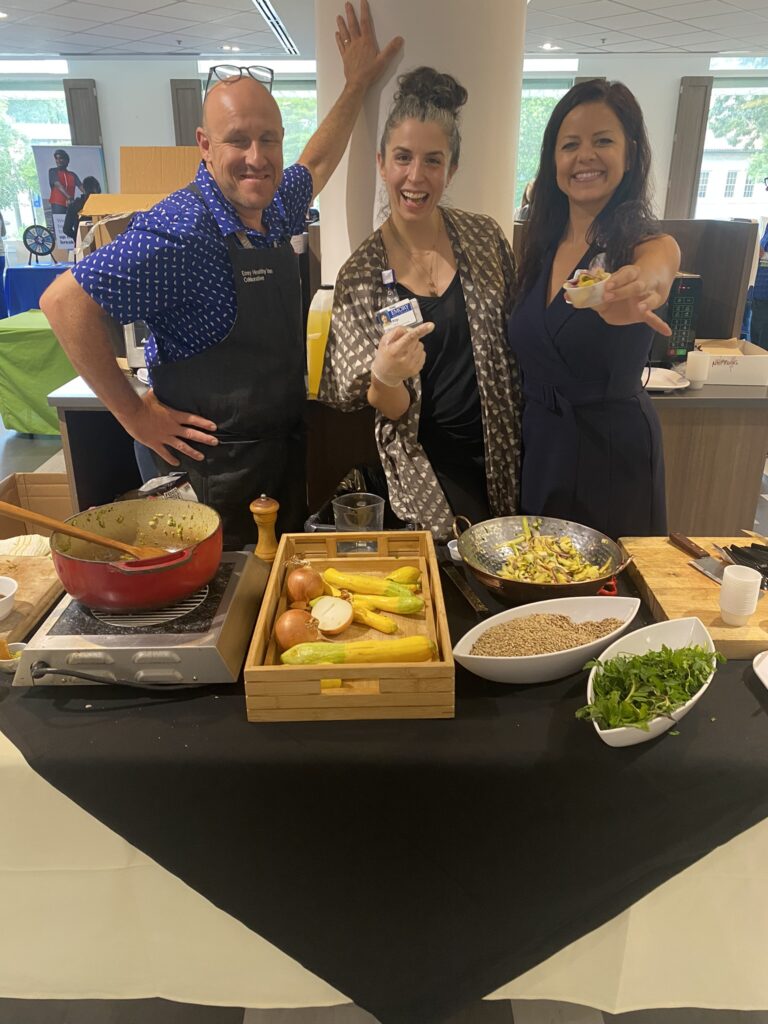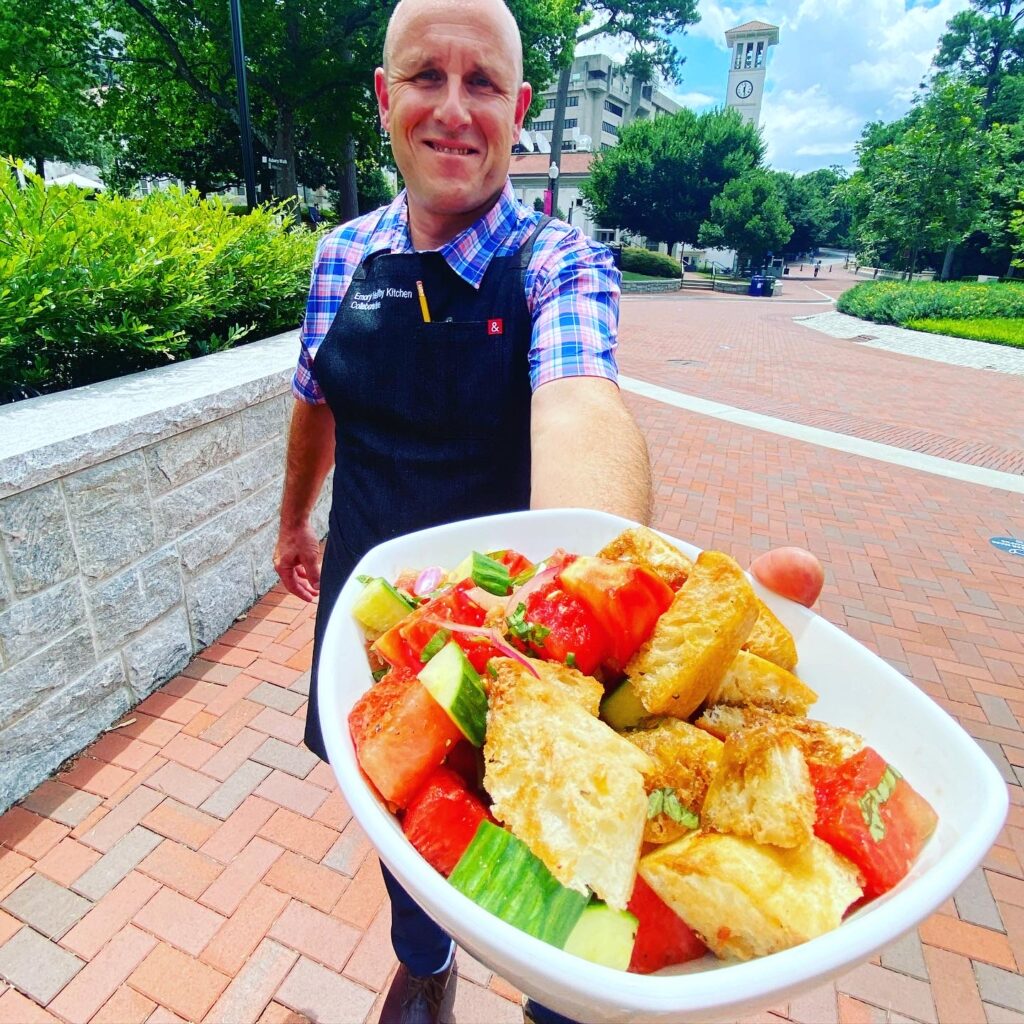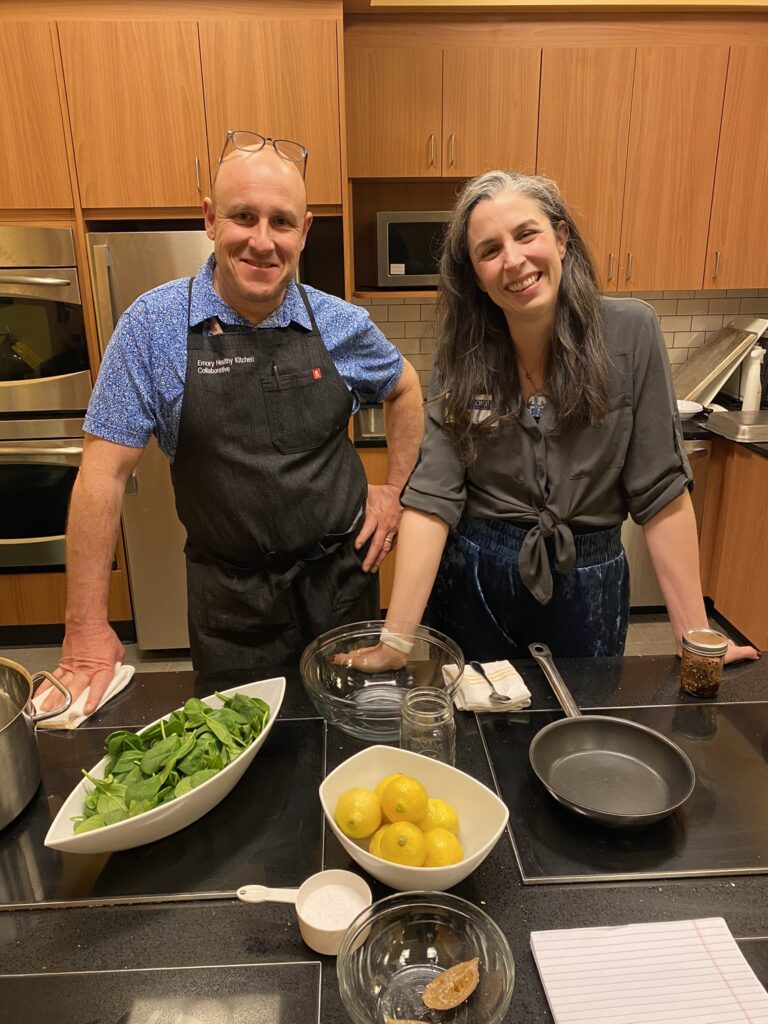Transforming Hospital Food From Bad to Healthy and Delicious
By Sally Crocker
ACLM’s Health Systems Council member Northwell Health transformed hospital food quality by eliminating processed options and sourcing locally, enhancing patient satisfaction. Their commitment to food as medicine has also sparked a shift towards healthier, plant-based menus at institutions like Emory, impacting their communities through wellness programs and culinary innovations.
When hospital care and services receive high marks on patient satisfaction surveys, yet the food is regularly dinged with searing feedback, it’s time to make a change. Some of ACLM’s Health Systems Council members are doing just that.
Sven Gierlinger, SVP/Chief Experience Officer at Northwell Health, New York state’s largest health care provider, remembers when patients reported their food as being “inedible,” “atrocious,” “unpalatable” and “not fit to feed a dog,” especially at a time, as one patient noted, when people “need good food to get better.”
Completely changing the food model across 21 hospitals serving more than 10 million meals a year was no easy feat.
Gierlinger, who has been with Northwell for nine years, has an extensive food and beverage background with Ritz Carlton Hotels. He’s worked as a chef and understands quality food service well. When making rounds through different Northwell hospitals, he began to see what patients meant, that the food was nothing to be proud of – “and that was an understatement,” Gierlinger said. What he found was embarrassing.
“We were serving fried, frozen and processed foods – not really good choices. There were very little fresh, healthy ingredients, and not much cooking was happening in the kitchen. Mostly, pre-prepared foods were warmed up and placed on plates,” he said. “It was easy to see why the food quality was negatively impacting our overall patient satisfaction ratings.”
Optimal nutrition
When people describe bad food, they often say it’s like hospital food. Instead, Gierlinger aspired to transport patients to a healthier, more pleasant experience. Optimal nutrition is one of six pillars of lifestyle medicine, a growing medical specialty that uses therapeutic lifestyle interventions as a primary modality to treat chronic conditions including, but not limited to, cardiovascular diseases, type 2 diabetes, and obesity.
One of the first steps to improvement involved assembling a steering committee that included the procurement department, marketing, nutrition support services and human resources, as there was also a desire to serve healthier food to the system’s 85,000-plus employees across the state. Together these leaders developed a strategic plan.
The Northwell commitment
From this effort came the CEO’s Northwell Health Food and Nutrition Commitment, outlining how the system is transforming the way food is purchased, cooked, and served to support the healing and well-being of patients, team members and the community, and to elevate the taste and quality of the foods prepared.
“Food is our most basic way to maintain good health, prevent sickness and maximize clinical benefit. At Northwell, we see food as health and as medicine,” the commitment says.
Processed food was eliminated from the menus. The Northwell Healthy Choice was created, determining the ingredients to be used and ways of achieving better quality through whole foods, freshly baked/never fried items and those containing less sugar and saturated fat. There is now a poster in every cafeteria explaining Northwell’s commitment to help change how people think about food.
With over 1,000 employees in food services, the plan also called for a new leadership role, which was filled by an award-winning, hospitality industry chef.
“We were very lucky to hire Chef Bruno Tison, an incredible talent known for his work at New York’s Plaza Hotel and California’s Fairmont Sonoma Mission Inn & Spa, where he earned a Michelin star. During his career, he’s also held positions with many other acclaimed restaurants in France and the U.S.,” Gierlinger said.
“Chef Tison taught our food service staff to cook fresh. Notably, two of his former top chefs followed him from Sonoma, which is the sign of a great leader,” Gierlinger noted.
Locally sourced food
Through attrition, vacant chef positions in the hospitals were almost exclusively filled with talents from the hospitality industry, paired with dieticians to develop healthful, well-presented and tasty menus fitting patient needs.
Relationships were developed with local farms to source fruits, vegetables, cheeses and other items, and today Northwell is developing its own rooftop farm on one of the system’s buildings. Collaborations were also developed with bakeries and other local businesses to produce fresh bread and pastries.
Patient satisfaction surveys now read very favorably about the food. Responders have submitted such comments as, “I was just so thrilled with everything that I didn’t even remember I was in pain and not feeling well…Each order appears to be individually prepared in the fashion of a fine hotel rather than a hospital…The impeccable service of the staff was first class, to say the least, and…We are here to recover, and sustenance plays an important role. Being in the hospital is never an enjoyable experience, but your caring meal preparation was the highlight of my stay.”
Emory also meets the challenge
Mike Bacha and Kip Hardy, MS, LD, RDN, have been with Georgia’s Emory Healthcare System for more than 15 years, and both came into their jobs with a passion for local, sustainable food. Their focus today has expanded to more plant-based menus for patients, staff and visitors.
Emory Healthcare, part of Emory University, is Georgia’s largest healthcare system, with 11 hospitals, the Emory Clinic and over 250 provider locations.
Bacha is assistant culinary director for Emory University Hospital, Emory Wesley Woods Hospital and Emory Orthopedic and Spine Hospital. Hardy serves as manager of food service projects in Bacha’s division.
Over the years, they’ve developed partnerships with local farms through a nonprofit distributor called The Common Market. This relationship helps Emory connect with smaller and mid-sized farms across the region that specialize in local, sustainable produce.
“I would describe our transition to fresher, plant-based menus as a slow drip,” Hardy said. “When I first arrived, tofu was pretty much unheard of, and kale was just a garnish on the salad bar. Many vegetables came frozen and ended up mushy on the plate.”
Southern cooking
Moving to fresher, healthier options was challenging considering the South’s penchant for fried, belly-filling comfort foods, so Bacha slowly introduced new menu items like deep fried tofu with a nod to that beloved Southern style. The department began showcasing beautiful produce, dried beans from around the country, interesting types of whole grains and rice, and new dishes like mushroom Bolognese and Emory’s own walnut lentil taco creation.
Transitioning the staff to new ways of food preparation took time.
When Emory opened a new bed tower and café in 2017, there was opportunity to create everything differently, including an entirely plant-based salad bar.
“Serving a variety of hospital café visitors is tricky,” Hardy said. “Because we receive patient transfers from other areas, many families drive a long way and want to eat something familiar and comforting; they may not be in the mindset to branch out foodwise. The challenge is in making a healthy menu item like cauliflower or Brussels sprouts taste really good.”
Emory’s chefs were moved out of the kitchen to the front service lines, preparing food at different stations as they talked with customers. This direct engagement has given the chefs valuable feedback on audience preferences and new menu items they’d like to see.
“This has been so motivating for our chefs,” Bacha said.
Complex needs versus daily demands
The bigger frontier to tackle now is the patient menu, balancing incredibly complex dietary needs with daily demands, while tempting patients to order new selections.
The main hospital campus comprises about 600 licensed beds, with about 40 in the orthopedic and spine hospital. There are two main campus cafeterias and two coffee shops, along with rehabilitation facility food service. The audience demographics and food preferences are very broad. Overall, the food service department of around 200 employees feeds a lot of people each day, including serving up to 600 patient trays per meal.
Emory sees some of the sickest patients in the country, with most on dietary restrictions, making the patient menu more complicated. There are usually provider recommendations for more plant-based servings, especially in areas like cardiology, neurology, oncology and solid organ transplantation. Each population needs something a little different.
When Hardy became a dietitian, she never thought she’d work in a hospital.
“When someone says you can make anything you want, that’s different, but if you have to create something for patients on a low sodium diet that tastes good and also works for other populations, it’s an interesting challenge,” she said.
The Emory team has always had an interest in food sustainability and encouraging people to eat more plant-based foods.
“Still, we’ve barely scratched the surface as to where we can go, especially in showcasing our talented chefs and all the healthy foods we can provide,” Bacha said.
Taking healthy advice to communities
Both Emory and Northwell are involved in their communities through symposiums, cooking demonstrations, participation in wellness fairs and more. Emory has even offered a community-wide, plant-based four-course healthy Valentine’s meal.
Bacha’s popular minestrone soup recipe has become part of the Admore Institute of Health’s “Full Plate Living” healthy holiday cookbook. Emory also works with registered dietitian learners and helps other institutional kitchens get started, traveling the country to promote these initiatives to hospitals and schools.













